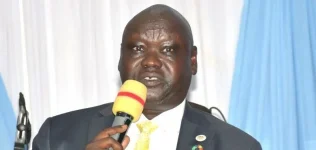Stephen Par Kuol laughed off his removal from the South Sudan peace office. As Minister of Peace Building, he rejected claims that he tried to push out Dr. Riek Machar from leadership. Nathaniel Pierino Oyet, who leads the SPLA-IO party right after Machar, kicked out Par Kuol plus three other big names on Monday. Oyet doubles as first deputy speaker in the national assembly. He blamed these four people for working with government groups to hurt Machar.
Par Kuol called the whole thing a silly joke. He believes the process broke all the rules that should guide such decisions. He fired back by claiming Oyet had run away from South Sudan. Par Kuol thinks Oyet has zero right to act like he runs the SPLA-IO party. The suspension cuts deep - Par Kuol loses his place in the Political Bureau, National Liberation Council, and his job as peace minister. He can no longer speak for SPLM-IO at RIMEC or call himself a party member.
Accusations against Par Kuol say he helped the SPLM-IG create problems inside SPLA-IO. Critics claim he worked to tear up the peace agreement known as R-ARCSS. They believe he tried to replace Dr. Machar with help from government political teams and security forces. The plan appears to involve many moving parts. Higher-ups in SPLA-IO reportedly want to hold a National Liberation Council meeting soon. This group has the power to pick new party leaders if they meet.
Dr. Machar faces serious trouble these days. He sits trapped inside his house, watched by soldiers who take orders from military intelligence and presidential guards. President Salva Kiir gave the command to keep him there. The government claims Machar planned to start fighting again. They worry he wants to make South Sudan unstable through rebellion. All this happens as tension builds between different power groups in the young nation.
The crisis shows deep cracks in South Sudan politics. Par Kuol represents just one piece of a larger power struggle. Both sides throw serious charges at each other. The SPLA-IO faces possible splits as some members may want new leadership. President Kiir keeps tight control through military forces that hold Machar captive. Peace agreements hang by a thread as leaders fight among themselves. The future remains unclear for both the peace process and those caught in leadership battles.
Par Kuol called the whole thing a silly joke. He believes the process broke all the rules that should guide such decisions. He fired back by claiming Oyet had run away from South Sudan. Par Kuol thinks Oyet has zero right to act like he runs the SPLA-IO party. The suspension cuts deep - Par Kuol loses his place in the Political Bureau, National Liberation Council, and his job as peace minister. He can no longer speak for SPLM-IO at RIMEC or call himself a party member.
Accusations against Par Kuol say he helped the SPLM-IG create problems inside SPLA-IO. Critics claim he worked to tear up the peace agreement known as R-ARCSS. They believe he tried to replace Dr. Machar with help from government political teams and security forces. The plan appears to involve many moving parts. Higher-ups in SPLA-IO reportedly want to hold a National Liberation Council meeting soon. This group has the power to pick new party leaders if they meet.
Dr. Machar faces serious trouble these days. He sits trapped inside his house, watched by soldiers who take orders from military intelligence and presidential guards. President Salva Kiir gave the command to keep him there. The government claims Machar planned to start fighting again. They worry he wants to make South Sudan unstable through rebellion. All this happens as tension builds between different power groups in the young nation.
The crisis shows deep cracks in South Sudan politics. Par Kuol represents just one piece of a larger power struggle. Both sides throw serious charges at each other. The SPLA-IO faces possible splits as some members may want new leadership. President Kiir keeps tight control through military forces that hold Machar captive. Peace agreements hang by a thread as leaders fight among themselves. The future remains unclear for both the peace process and those caught in leadership battles.












